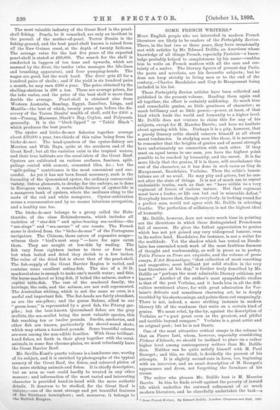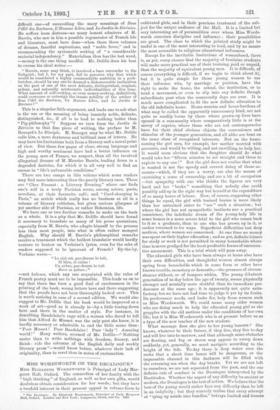SOME FRENCH WRITERS.* MOST English people who are interested in
modern French literature are likely to be readers of the Fortnightly Review. There, in the last two or three years, they have occasionally met with articles by Mr. Edward Delille, an American whose knowledge of all things French, especially Parisian—a know- ledge probably helped to completeness by his name—enables him to write on French matters with all the ease and cer- tainty of a native. The literary figures of present-day Paris, the poets and novelists, are his favourite subjects ; but he does not keep strictly to living men or to the end of the century,—Charles Baudelaire and Guy de Maupassant being included in his list.
These Fortnightly Review articles have been collected and published in the present volume. Reading them again and all together, the effect is certainly saddening. So much true and remarkable genius, so little greatness of character ; so much brilliancy and so little power,—power, at least, of that kind which leads the world and humanity to a higher level. Mr. Delille does not venture to claim this for any of his subjects, except for M. Maurice Barrels; and here we hesitate about agreeing with him. Perhaps it is a pity, however, that a purely literary critic should concern himself at all about moral tendencies. In studying men like these, it is necessary 'to remember that the heights of genius and of moral strength have unfortunately no connection with each other. If they meet on equal terms in one man, you have the highest point possible to be reached by humanity, and the rarest. It is far more likely that the genius, if it is there, will overbalance the rest of the character, as it has done in such cases as Guy de Maupassant, Baudelaire, Verlaine. Then the critic's lamen- tations are of no avail. He may pity and grieve, but he can- not alter the state of things. It is not of much use to repeat undeniable truths, such as that we " have within us a very regiment of forces of various nature. But that regiment must have a leader, or life can but end in miserable defeat." Everybody knows that, though everybody, in looking round for a perfect man, would not agree with Mr. Delille in selecting Goethe. The perfection of selfishness is not the highest ideal of humanity.
Mr. Delille, however, does not waste much time in pointing out the directions in which these distinguished Frenchmen fail of success. He gives the fullest appreciation to genius which has not yet gained any very widespread honour, even in its native land. Baudelaire, for instance, is not a writer for the multitude. Yet the shadow which has rested on Baude- laire has concealed much work of the most faultless fineness of thought and workmanship, as well in prose as in poetry. Petits Polmes en Prose are exquisite, and the volume of prose essays, L'Art Romantigue, "that collection of most searching and suggestive, most brilliant yet solid studies in the very beat literature of his day," is further truly described by Mr. Delille as " perhaps the most admirable literary criticism yet known." Another of the author's most sympathetic studies is that of the poet Verlaine, and it lands him in all the diffi- culties mentioned above, for with great admiration for Ver- laine's delicate and sometimes charming art, he is deeply troubled by his shortcomings, and points them out unsparingly. There is not, indeed, a more striking instance in modern literary life of the weakness that waits on a certain kind of genius. We must rebel, by-the-by, against the description of Verlaine as "a poet great even as the greatest, and pitiful and terrible beyond compare." Verlaine is a great artist and an original poet ; but he is not Dante.
One of the most attractive critical essays in the volume is that on Pierre Loti, whom, however, especially considering Pgeheur crislande, we should be inclined to place on a rather higher level among contemporary writers than Mr. Delille does. Neither can he quite satisfy himself with M. Paul Bourget ; and this, we think, is decidedly the poorest of his attempts. It is slightly second-rate in form, too, beginning with an interview, and an exact description of M. Bourget's appearance and dress, not forgetting the furniture of his rooms.
The writer who pleases Mr. Delille best is M. Maurice Barrel. In him he finds revolt against the poverty of inward life which underlies the outward refinement of so much modern literature, and he cheerfully undertakes the task—a • Sono French Writer:. By Edward Donne. London: Ohapman and Hall. 1893 difficult one—of unravelling the mazy meanings of Sous l'CEil des Barbares, L'Efarnme Libre, and Le Tardin de Berenice.
He suffers keen distress—as many honest admirers of M. Barres, who saw in him a possible regenerator of French life and literature, must have done—when these three volumes of dreams, fanciful aspirations, and "noble fever," end in recommending the systematic seeking of " a considerable material independency." Materialism thus has the last word, —money is the one thing needful. Mr. Delille does his beet to excuse his ideal writer :— " Herein, some may think, is involved a base surrender to the Zeitgeist ; but I, for my part, fail to perceive why that which would be considered a highly commendable ambition in a pork- butcher, should by any one be deemed a dishonourable inclination on the part of one of the most delicate, distinguished, original, ardent, and naturally aristocratic individualities of this time. What amount of self-seeking, or even money-seeking, definitively could overcome or outweigh the innate nobility of the author of Sous Mil des Barba/ma, Iffn Homme Libre, and Le Jardin de .13iFrenice ? "
This is a singular little argument, and leads one to ask what is the use or the meaning of being innately noble, delicate, distinguished, &c., if all is to lead to nothing better than "Pig-philosophy"? Suppose we turn from the Jardin de Berenice to that fine piece of writing, the preface to M. Bourget's Le Disciple. M. Bourget may be what Mr. Delille calls him, a mere dexterous and brilliant man of letters. He may have his limitations both from a literary and a moral point of view. But those few pages of clear, strong language and high and worthy sentiment have had a better influence on the young men of France, we suspect, than all the involved allegorical dreams of M. Maurice Barris, leading down to a degraded doctrine, for which it is all very well to find an excuse in " life's unbearable conditions."
There are two essays in this volume which some readers may find more interesting than the purely literary ones. These are " Chez Pousset : a Literary Evening," where one finds one's self in a truly Parisian scene, among actors, poets, novelists, at their favourite café; and " Card-sharping in Paris," an article which really has no business at all in a volume of literary criticism, but gives curious glimpses of yet another side of Parisian, or rather Bohemian, life.
We have one or two further remarks to make on the book as a whole. It is a pity that Mr. Delille should have found
it necessary to translate so many of his prose quotations, especially from M. Banes, who adapts himself to the process
less than most people, into what is often rather mongrel English. Why should M. Barres's philosophical remarks receive a treatment which the boldest translator would hardly venture to bestow on Verlaine's lyrics, even for the sake of readers supposed to be ignorant of French ? By-the-by, Verlaine wrote- " Le del est, par-dessus is toit, Si bleu, si calms !
Un arbre, par-dessus is toit Bove sa palms ;" —not balance, which any one acquainted with the rules of French poetry must see to be impossible. This leads us on to say that there has been a good deal of carelessness in the printing of the book, wrong letters here and there suggesting that the proofs have not been thoroughly looked over. This is worth noticing in case of a second edition. We would also suggest to Mr. Delille that his book would be improved as a work of art—good as it already is—by a little toning-down here and there in the matter of style. For instance, in describing Baudelaire's rage with a woman who dared to tell him that Alfred de Musset was the only poet she knew, it is hardly necessary or admirable to end the little scene thus : "Poor Musset ! Poor Baudelaire ! Poor lady'! Amazing world !" Many writers, scorned of Mr. Delille—" Nothing easier than to write nothings with freedom, fluency, and finish : vide the columns of the English daily and weekly literary press "—would know better, whatever their lack of originality, than to revel thus in notes of exclamation.



















































 Previous page
Previous page